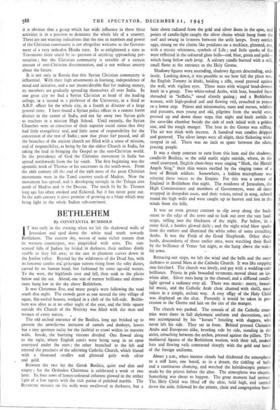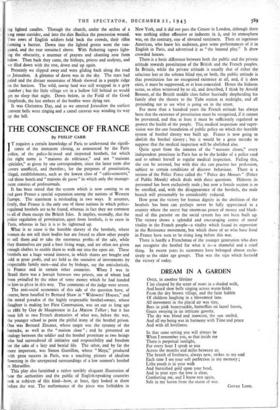BETHLEHEM
By CONSTANTIA RUMBOLD T was early in the evening when we left the shadowed walls of 1 Jerusalem and sped down the white road south towards Bethlehem. The eastern sky, woven of some richer texture than its western counterpart, was pinpricked with stars. The sun- scarred hills of Judaea lay folded its darkness, their outlines dimly visible as they fell away to the east in phantom curves down to the Jordan valley. Beyond lay the wilderness of the Dead Sea, with its fantastic castles and grotesque turrets rising from the salty dunes, carved by no human hand, but fashioned by some age-old waters. To the west, the highlands rose and fell, then sank to the plains below and the sea. Ahead, one star of meteor brilliance and dimen- sions hung low in the sky above Bethlehem.
It was Christmas Eve, and many people were following the road south that night. The crowds grew as one neared the tiny village of squat, flat-roofed houses, wedged in a cleft of the hill-side. Bethle- hem was alive as at no other night of the year, and the little square outside the Church of the Nativity was filled with the men and women of every nation. „ The old arched entrance of the Basilica, long ago bricked up to prevent the unwelcome intrusion of camels and donkeys, leaves but a tiny aperture today for the faithful to crawl within its massive walls. Inside, the hurrying streams divided. One flowed along to the right, where English carols were being sung in an open courtyard under the stars ; the other branched to the left and entered the precincts of the adjoining Catholic Church, which blazed with a thousand candles and glittered gaily with silver , and gold.
Between the two lay the Greek Basilica, quiet and dim and empty ; for the Orthodox Christmas is celebrated a week or two later. Its four rows of honey-coloured columns glowed in the amber light of a few tapers with the rich patina of polished marble. The Byzantine mosaics on the walls were swallowed in darkness, but a faint sheen radiated from the gold and silver Ikons in the apse, and points of candle-light caught the silver chains which hung from the roof and swung in festoons between the unlit lamps. Ivory ostrich eggs, strung on the chains like pendants on a necklace, gleamed, too, with a mystic whiteness, symbols of Life; and little sparks of fire were reflected in the coloured glass balls—red, blue, green and gold—. which hung below each lamp. A solitary candle burned with a still, small flame at the entrance to the Holy Grotto.
Shadowy figures were ascending, shadowy figures descending, end- lessly. Looking down, it was possible to see how full the place was. An English Tommy in khaki, holding a rifle, stood pressed against the wall, with vigilant eyes. Three nuns with winged head-dresses knelt in a group. Two white-robed Arabs, with lean, bearded faces shrouded in "keffiehs," stood silently gazing ; and a Bethlehem woman, with high-peaked coif and flowing veil, crouched in prayer on a lower step. Priests and missionaries, nuns and nurses, soldiers and peasants, men young and old, pilgrims from the world over, pressed up and down those steps that night and knelt awhile in the cave-like chamber beside the slab of rock inlaid with a golden star, and the rough manger. The heat in the Grotto was stifling. The air was thick with incense. A hundred wax candles dripped and guttered. The silver lamps were all alight, their flickering wicks steeped in oil. There was no inch to spare between the silent, praying people. , It was a sharp contrast to turn from this heat and the shadowy, candle-lit Basilica, to the cold starlit night outside, where, in the small courtyard, English choir-boys were singing "Hark, the Herald Angels Sing," their thin voices swelled by the ringing tones of a host of British soldiers. Somewhere, a hidden microphone was relaying these voices to the Empire. For this was a corner of England in Bethlehem that night. The residents of Jerusalem, the High Commissioner and members of Government, were all there wrapped in sheepskin coats, and their voices, raised in song, echoed round the high walls and were caught up to heaven and lost in the winds from the hills.
It was an even greater contrast to slip away along the back- street to the edge of the town and to look out over the vast land- scape, rolling into the blackness of the night. Far below, In a stony field, a bonfire glowed dully ; and the night wind blew sparks from the embers and illumined the white robes of some crouching Arabs. It was the Field of the Good Shepherds. Other shep- herds, descendants of those earlier ones, were watching their flock by the brilliance of Venus :hat night, as she hung above the wake-
ful town. •
Retracing our steps, we left the wind and the bells and the outer darkness to attend Mass at the Catholic Church. It was like stepping into fairyland. The church was lovely, and gay with a wedding-cake brilliance. Priests in pale brocaded vestments moved about an ice- white altar. Silver stars hung in the chancel, and a diffused candle- light spread a radiance over all. There was music: merry, beauti- ful music, and the Catholic Arab choir chanted with shrill, nasal voices in a simple, archaic way. A rosy effigy of the Holy Child was displayed on the altar. Presently it would be taken in pro- cession to the Grotto and laid on the site of the manger.
The church was packed. The consuls of all the Catholic coun- tries were there in full diplomatic uniform and decorations, each one accompanied by his " kavass " bristling with daggers, who never left his side. They sat in front. Behind pressed Christian Arabs arid Europeans alike, kneeling side by side, standing in the aisles, crouching between the arches, pressed against the pillars. The mediaeval figures of the Bethlehem women, with their tall, peaked hats and flowing veils contrasted sharply with the gold and braid of the foreign uniforms.
About 3 a.m., when incense clouds had thickened the atmosphere to a stiff haze, one heard, as in a dream, the tinkling of bells and a continuous chanting, and watched the kaleidoscopic patterns made by the priests before the altar. The atmosphere was electric. Something was about to happen. The great moment had arrived. The Holy Child was lifted off the altar, held .high, and carried down the aisle. followed by the priests, choir and congregation bear-
ing lighted candles. Through the church, under the arches of a long stone corridor, and into the dim Basilica the procession wound. Two rows of Fnglish soldiers held back the crowds, their rifles forming .a barrier. Down into the lighted grotto went the van- guard, and the rear ranainei above. With flickering tapers light- ing the obscurity, a murmur of prayers and chanting rose from below. Then back they came, the bishops, priests and acolytes, and we filed down with the rest, down and up again.
Presently we slipped away and were gliding back along the road to Jerusalem. A glimmer of dawn was in the sky. The stars had paled and the distant mountains of Moab showed in a purple ridge on the horizon. The wild, tawny land was still wrapped in a grey slumber ; but the little village set in a hollow fiill behind us would get no sleep that night. Down below, in the Field of the Good Shepherds, the last embers of the bonfire were dying out.
It was Christmas Day, and as we entered Jerusalem the earliest convent bells were ringing and a camel caravan was winding its way up the hill.































 Previous page
Previous page